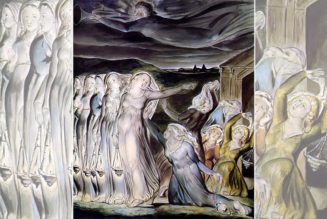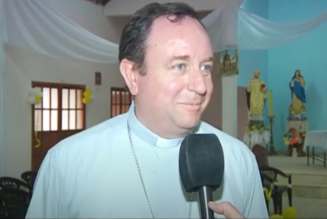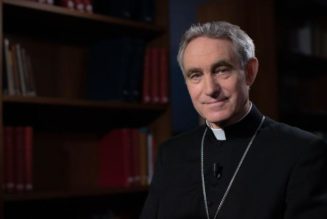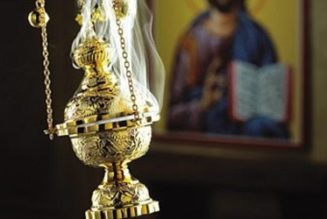By Dr. Jeff Mirus ( bio – articles – email ) | Nov 14, 2023
Reflecting back on the the (potential) Providential trajectory I outlined in Friday’s commentary, I began wondering about how the turmoil we are witnessing in the Church might relate to God’s plans for Christian unity. After all, the multiplicity of different churches and denominations claiming the name “Christian” seriously undermines the Christian claim to be “of God”, and therefore rather obviously dampens the persuasiveness and impact of even an authentic Catholic renewal.
There is no escaping that Christian disunity seriously undermines the persuasiveness of the Gospel of Jesus Christ. But what I am trying to do now and last Friday is to suggest that the discouragement we may feel given the widespread absence of faith in both the Church and the world today ought not to lead us to despair, or to the conclusion that Satan has the upper hand. I am claiming that we can just as easily see God’s Providence at work.
What I am considering today is not the lack of rational justification for Christian bodies that cannot trace their history back to Christ, but rather the future prospects for Christian unity based on the Providential trajectory I (claim to have) identified a few days ago, the trajectory of “stimulus and response” over the past seventy-five years which seems slowly to be effecting a genuine renewal in the Catholic Church. God knows that this renewal is still being resisted tooth and claw, and that this is always the case, and yet we also know that any Providential trajectory, could we but perceive it properly, will give evidence not only of degeneration but also of regeneration.
God is not dead, as the song says, nor doth He sleep. It would be a wonderful thing—indeed, in itself a miraculous thing—if the immensity of the Catholic Church as a human institution can be renewed in this twenty-first century after Christ to more perfectly reflect its Divine essence. It would be more remarkable still if such a renewal brought in its wake a rapid reduction of the multiplicity of Christian sects which all, in one way or another, have set themselves up as competitors to the Church of Christ.
My further argument today is that there is ample evidence for this possibility.
Secularization winnows out
Are we not beginning to witness the failure of Christian sectarianism? It is true that in the Evangelical and Pentecostal corners of the Protestant universe, Christians are often formed in sufficient opposition to the dominant culture for various “denominations” to maintain an identifiably Christian vigor. But it is also very clear that the oldline/mainline churches have almost universally splintered and dramatically declined in Christian identity, cohesiveness, numbers and influence. Many of them, from Anglicanism/Episcopalianism on “down” have become vestiges of their former selves, characterized by worldly programs covered by what we might call a very soft (and therefore easily marred) Christian veneer.
In fact, the most sincerely Christian of those remaining in all these bodies have had either to switch their denominational allegiance or to enter the Catholic Church. This is so true that former Protestants who have entered the Church have very frequently lived out their Christian witness in ways that have struck too many existing Catholics as extraordinarily vibrant if not strangely severe. There have been several developments along these lines over at least the past two generations, from the entry into the Church of large numbers of what we might call liturgical evangelicals to the formal accommodation of whole Anglican parishes in what the Church calls the “Anglican Use”.
But the lesson of the last seventy-five years is that while the Catholic Church has been rocked by secularistic infidelity at every level in a host of distressingly human ways, many of the old Protestant churches are no longer recognizable, or are dramatically reduced in size, or have all but disappeared. The culture wars are sounding the death knell of one Christian group after another. Most are withering rapidly. (They are, after all, at least partially severed from the true vine.) In other words, as Christian bodies go, if you think the Catholic Church has problems, you haven’t seen anything yet.
Ecumenism or conversion?
It is an additional fascinating feature of the (possible) Providential trajectory I outlined last Friday that the ecumenical movement was conceived and implemented during the early part of the period in question, just shortly before the dominant culture in the West became openly relativistic (and therefore essentially atheistic). Indeed, it is a signal feature of my (putative) Providential trajectory that a concerted effort at greater Christian unity on the part of the Catholic Church should have come precisely at the moment in God’s plan when the widening gap between the Church and the world should render the survival of a great many Christian denominations so suddenly and extraordinarily doubtful.
At times during the practice of ecumenism (which, I hasten to add, applies only to the relationship between the Church and other Christian bodies), there has been ample cause for uneasiness simply because, at the same time as ecumenism bloomed, we found that many Catholic participants no longer took Christian teaching on faith and morals seriously. This was most often not the case in discussions at the highest levels where joint statements have been occasionally hammered out, resulting in genuine theological insight about common ground. But it was certainly common enough in the more local manifestations of the movement. In any case, I take it as undeniable that a great deal of the improvement in human relations between various Christian groups occurred at least partly because the significance of the differences was no longer taken very seriously—and this for the very simple reason that Divine Revelation itself was no longer taken nearly as seriously as it had been in previous generations.
But then, as I have already mentioned, an astonishing number of conversions to Catholicism began to occur among Protestant seminarians and pastors (and others). Some have described their experience as one of studying in environments which were so favorable to mutual understanding that they seemed to be in a car travelling rapidly toward unity. Therefore, when their Protestant professors and mentors slammed on the brakes, they went through the windshield and landed…in Rome. This experience is already at least a full generation old. Since then the Reformation churches have split and dwindled in a manner unimaginable even in a sadly divided and weakened Catholicism.
I do not, then, mean to belittle ecumenism. But the fulfillment of our human efforts is rarely what we expect. Therefore, we might well find that, under the pressure of secularization, the vastly greater attrition in Protestantism as compared with Catholicism will also be the key to recognizing in the Catholic Church the spiritual equivalent of what in physics is called a singularity—that is, a reality so dense that the curvature of spacetime becomes infinite.
Meaning?
I should add here at least some consideration of the Orthodox Churches. These are genuine churches which, probably because of their intense traditionalism, do not suffer nearly as widely or deeply from the ravages of our contemporary cultural secularism. Unfortunately, however, they continue to be crippled by the ravages of a far older secularism, that is, the territorial secularism which makes each one a rival of the others. Has this not also been made abundantly clear in our modern era, most recently by the posturing of the various Orthodox Churches on the war between Russia and Ukraine? Truly, it is very difficult to recognize the universal Church of Christ in Orthodoxy precisely because of its abject earthly territorialism.
Nevertheless, the relationship between the Catholic Church and the Orthodox Churches has improved dramatically during this same Providential period we are discussing. For this reason, I believe it is possible to posit, as part of this same Providential reading of the signs of the times, the possibility that we can see the beginnings of the reunion of all Christians in the specific and universal Church Christ Himself founded. Though there have always been both schisms and heresies (heresy comes from the Greek word for “choice”), this does not mean that the deviation from Divine Revelation through historically unfortunate “choices” about the nature of the Church Christ founded must be perpetuated until the end of time, at least not to the same extent and in the same form in which we experience them today.
Might we not hope, then, that the winnowing with which all Christian groups are being winnowed today—a winnowing which must obviously also be part of the Providential trajectory I outlined on Friday—will, under the very pressure of its adversity, tend toward a coalescence with a renewed Catholicism?
The signs of the times do not lie. The question is whether we can recognize and act on the good possibilities they reveal. There is much to favor the reading I have offered in my last two essays, even if I am completely wrong in assessing the various particulars, and even if I have no idea of the Providential timetable. Indeed, we can always read in ways that enable us to see God’s Presence. Such a reading asks of us only to have confidence that, no matter how dark things seem, God is always working for good. In other words, it asks only that we recognize our Divine call to live in hope, doing God’s will at each and every moment, and offering our own sufferings to make up what is lacking in the sufferings of Christ for the sake of his body the Church (Col 1:24).
Our Lord has promised repeatedly that He is coming soon, with his recompense in His hand—He who is the Alpha and the Omega, the first and the last, the beginning and the end (Rev 22:12-13). But until He comes we are called, I think, to interpret history primarily as Our Lord’s effort to make His invitation clear to all of us. That invitation is most clearly offered, and totally fulfilled in time, only through His Presence in the Church.
Any sort of ultimate disgruntlement is impermissible to the Christian. It is always a mistake to think that nothing good can happen, or that the Church has ultimately failed, or that our own prayers and efforts and sufferings in obedience to Christ and the Church are fruitless and of no account. God has a plan in everything. Sometimes we cannot see beyond the call to personal holiness here and now. But sometimes we can discern something helpful in a Providential reading of events—in recognition of both the earthly realities which we are bound to experience, and the spiritual realities in which we are bound to hope.
Sound Off! CatholicCulture.org supporters weigh in.
All comments are moderated. To lighten our editing burden, only current donors are allowed to Sound Off. If you are a current donor, log in to see the comment form; otherwise please support our work, and Sound Off!











